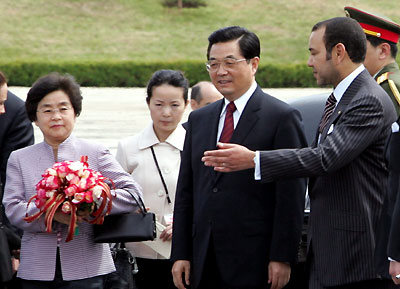President Hu Jintao arrived in Rabat, capital of Morocco, on a state visit
yesterday and was scheduled to hold talks with King Mohammed VI in the evening.
 |
|
| President Hu
Jintao (C) and his wife Liu Yongqing (L) are welcomed by Moroccan King
Mohammed in Rabat April 24, 2006. Hu kicked off a three-nation tour of
Africa in Morocco on Monday, boosting already booming ties to a continent
rich in the energy and minerals his country needs to feed a fast-growing
economy. [Reuters] |
|
In a
written speech delivered upon arrival, Hu said although China and Morocco are
geographically far apart, the friendship between them dated back to ancient
times.
During the visit, agreements were expected to be signed on economic,
technical, scientific, cultural and medical co-operation early this morning
Beijing time. Morocco is eight hours behind China.
The north African nation is the third leg of Hu's five-nation tour, which has
taken him to the United States and Saudi Arabia, will also see him visit Nigeria
and Kenya.
Trade between China and Morocco has grown rapidly, reaching US$1.48 billion
last year, according to Foreign Ministry statistics.
Commodities that China exports to Morocco mainly include light industrial
products, textiles, green tea, and mechanical and electronic products. It
imports phosphates, chemical fertilizer and cobalt sand.
China and Morocco established diplomatic relations in November 1958.
Taib Fassi Fihri, who visited China as a special envoy of King Mohammed VI
earlier this month, told reporters that the Moroccan side is "quite satisfied
with the current economic ties and do believe they will continue to forge
ahead."
He said he hoped more Chinese enterprises which are active in such areas as
government purchasing, electricity and infrastructure construction would invest
in his country.
On his first state visit to Saudi Arabia, Hu listed key areas for
co-operation between the two nations including investment, energy, trade,
culture and education sectors.
Saudi Arabia is China's biggest trade partner in West Asia, with bilateral
trade volume reaching US$16 billion last year.